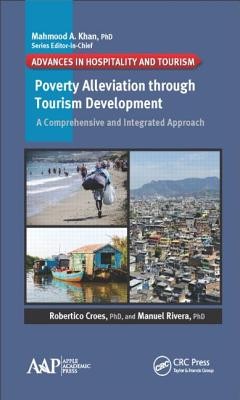
- We will send in 10–14 business days.
- Author: Robertico Croes
- Publisher: Apple Academic Press
- ISBN-10: 1771881410
- ISBN-13: 9781771881418
- Format: 15.2 x 23.4 x 2 cm, kieti viršeliai
- Language: English
- SAVE -10% with code: EXTRA
Reviews
Description
The book offers a comprehensive and integrated approach to the topic of tourism development and its contribution to the fight against poverty. Tourism development is credited to be a powerful source of regional development and improvement in developing countries, and the focus of the book is on the world's poorest areas and how tourism connects to the poor and unlocks opportunities to escape the poverty trap.
This book takes a comprehensive and unique approach by combining a decade of research on the effects of tourism development on poverty reduction in Latin America. The book explores poverty and its impact on development at the macro and micro levels. Then, it goes on to focus on tourism development and its effects on growth, inequality, and poverty reduction and how these dynamic relationships affect the most vulnerable groups of society. The research also documents on how the poor perceive tourism development on their lives and if they see it as an important vehicle to help them escape from poverty. Lastly, the authors map the conditions under which tourism can reach the poor and how tourism can offer opportunities for impoverished areas and their residents.
Combining tourism dynamics, development economics, poverty reduction, business practices, and a sustainable perspective, the book takes a broad look at this important issue. The book will be informative and valuable to a higher educational audience, including academia and researchers, as well as practitioners, policymakers, and international organizations, and graduate students.
EXTRA 10 % discount with code: EXTRA
The promotion ends in 21d.19:36:24
The discount code is valid when purchasing from 10 €. Discounts do not stack.
- Author: Robertico Croes
- Publisher: Apple Academic Press
- ISBN-10: 1771881410
- ISBN-13: 9781771881418
- Format: 15.2 x 23.4 x 2 cm, kieti viršeliai
- Language: English English
The book offers a comprehensive and integrated approach to the topic of tourism development and its contribution to the fight against poverty. Tourism development is credited to be a powerful source of regional development and improvement in developing countries, and the focus of the book is on the world's poorest areas and how tourism connects to the poor and unlocks opportunities to escape the poverty trap.
This book takes a comprehensive and unique approach by combining a decade of research on the effects of tourism development on poverty reduction in Latin America. The book explores poverty and its impact on development at the macro and micro levels. Then, it goes on to focus on tourism development and its effects on growth, inequality, and poverty reduction and how these dynamic relationships affect the most vulnerable groups of society. The research also documents on how the poor perceive tourism development on their lives and if they see it as an important vehicle to help them escape from poverty. Lastly, the authors map the conditions under which tourism can reach the poor and how tourism can offer opportunities for impoverished areas and their residents.
Combining tourism dynamics, development economics, poverty reduction, business practices, and a sustainable perspective, the book takes a broad look at this important issue. The book will be informative and valuable to a higher educational audience, including academia and researchers, as well as practitioners, policymakers, and international organizations, and graduate students.


Reviews